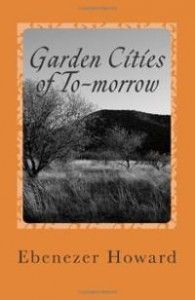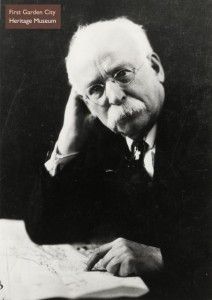 Ebenezer Howard
Ebenezer Howard
(1850-1928)
Ebenezer Howard was the father of England’s Garden Cities. In 1898, he published Tomorrow: A Peaceful Path to Real Reform, later reissued as Garden Cities of  Tomorrow. This book became a seminal text in the emerging field of city planning, especially in the United States, influencing people like Lewis Mumford, Clarence Stein, Frederick Law Olmsted, and Arthur Morgan. The sweeping solution that Howard proposed for the crowding and chaos of urban areas was the creation of planned communities of 32,000 people, ringing major cities and combining the best features of town and country.
Tomorrow. This book became a seminal text in the emerging field of city planning, especially in the United States, influencing people like Lewis Mumford, Clarence Stein, Frederick Law Olmsted, and Arthur Morgan. The sweeping solution that Howard proposed for the crowding and chaos of urban areas was the creation of planned communities of 32,000 people, ringing major cities and combining the best features of town and country.
Inspired by Henry George, he wanted to capture the  appreciating value of land (the "unearned increment") for public improvement, not private enrichment. Unlike George, his mechanism of choice was not the single tax but municipal ownership. His Garden Cities were to be developed on land that was leased from a municipal corporation, where "men of probity" would serve as "trustees."
appreciating value of land (the "unearned increment") for public improvement, not private enrichment. Unlike George, his mechanism of choice was not the single tax but municipal ownership. His Garden Cities were to be developed on land that was leased from a municipal corporation, where "men of probity" would serve as "trustees."
Eventually, over 30 Garden Cities were developed in England, beginning with Letchworth in 1903 and Welwyn in 1920. Howard moved to Letchworth himself soon after it was established, living in a limited equity housing cooperative on leased land.
Further Reading:
Peter Hall, Cities of Tomorrow, 3rd ed. (Malden, Massachusetts: Blackwell, 2002).
Peter Hall and C. Ward, Sociable Cities: the Legacy of Ebenezer Howard, Chichester: John Wiley & Sons, 1998).
Dennis Hardy, Utopian England: Community Experiments 1900-1945 (London/New York: Routledge, 2000).
Ebenezer Howard, Garden Cities of To-Morrow (Cambridge MA: MIT Press, 1965).
NOVEMBER 2019
Roots&Branches is now part of the Center for Community Land Trust Innovation: www.cltweb.org. We’re migrating much of the content from Roots&Branches to this new website — and as such, Roots&Branches will go into archival mode.
CONTACT: Please feel free to email Greg Rosenberg with any questions you have at [email protected].